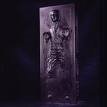I know it is off topic for Honoring the Office of the Holy Ministry, but......
Back in the mid 90’s a good friend of mine, Victor Minetola, with a recording studio in his basement, came up with a great way for us to give out cheap Christmas presents: Record a Christmas tape!
He recently put three of the best that we did on his website: http://hyp0static.com/projects/projects
“Born in Bethlehem” was written by Victor (I wrote one stanza)
“The Coventry Carol” was arranged by Victor and me and is kind of what one ends up with when punk meets traditional hymns – but still respectful.
“A Fire is Started in Bethlehem” is my favorite.
I am playing guitar on all of the pieces.
It isn’t the Rapps, but it ain't too shabby.
Tuesday, November 27, 2007
Saturday, November 10, 2007
God Speaks Through Real Mouths!
 I don't know about you, but I've always had the cinematic picture of God speaking to a bewildered Noah from the clouds, and Noah (played by John Huston) looking around to see where this mysterious voice (I think also played by him) is coming from until he recognizes it as the voice of God.
I don't know about you, but I've always had the cinematic picture of God speaking to a bewildered Noah from the clouds, and Noah (played by John Huston) looking around to see where this mysterious voice (I think also played by him) is coming from until he recognizes it as the voice of God. This is even more enforced by movies like George Burns in "Oh, God!" and the recent "Evan Almighty" where God (in this case Morgan Freeman) has to make repeated special miraculous appearances to convince the hearers that it is, indeed, God who is speaking to them.
This is even more enforced by movies like George Burns in "Oh, God!" and the recent "Evan Almighty" where God (in this case Morgan Freeman) has to make repeated special miraculous appearances to convince the hearers that it is, indeed, God who is speaking to them.Why do we think that when Scripture says God speaks to someone that it must be through some strange or miraculous means? I think it is because we think of God as some kind of distant deity who doesn't have a natural and constant means of connection to His people in this material world.
 Alternately, some people think God exercises a special hot-line connection to them (or visa versa) through emotional experiences, signs, and/or wonders. Well, what do we Lutherans believe? In other words, what does Scripture have to say about this?
Alternately, some people think God exercises a special hot-line connection to them (or visa versa) through emotional experiences, signs, and/or wonders. Well, what do we Lutherans believe? In other words, what does Scripture have to say about this?These are the generations of Shem. Shem was a hundred years old and fathered Arpachshad two years after the flood... [Genesis 11:10]
These genealogies always seem to me like useless tidbits of Biblical trivia at first blush. However, let us consider Luther's commentary on this verse:
Even Abraham was almost swallowed up by the church of Nimrod; but he was called back by the voice of the Lord, who admonished him to separate from the ungodly race and to seek a new abode. I believe that this was done by Shem himself. Since he was the ruler of the church and had the promise concerning Christ, he was held in high esteem by his grandsons; for his ministry was in truth a ministry of God, and what he ordered, his grandsons received as the voice of God.
Thus when it is written that Rebecca consulted the Lord (Gen. 25:22), I think that she consulted Shem himself, whom the Lord wanted to be at the head of the church. For Shem died when Jacob and Esau were fifty years old; and when men who are full of the Holy Spirit speak, it is God who is speaking. At about this time the kingdom of Egypt had its beginning, for the account states that Abraham went down to Egypt.
Hence it is the main point of this chapter to have us realize where the church was at that time, by which fathers it was governed, and finally which fathers were contemporaries.
Luther's Works, Volume 2: Lectures on Genesis (Ge 11:10)
I searched for this Luther quote on my Luther's Works CD (Libronix) after hearing that Luther believed that when God spoke to Noah he did so through Methuselah. Perhaps it's speculative, but according to this theory, God through Adam confronted Cain with the sin of killing Abel, and Abraham was called by God through Shem to leave Ur and go to the promised land. Before we dismiss this as pure speculation, consider that God's Holy Word itself says:
For prophecy was not borne at any time by the will of man, but holy men of God spoke being borne along by the Holy Spirit. [2 Peter, 1:21 - emphasis mine]
Apparently, throughout his commentaries on the Old Testament, at almost every point in history in which God spoke, Luther was able to find a patriarch who was alive and who could speak for God in His place. Peter obviously wouldn't have found this such a novel idea.
So perhaps it's not all that speculative. It is certainly a great comfort to know that God normally uses means to communicate with us. We aren't left (like the enthusiasts and charismatics in our midst think) to try to discern God's voice in superstitious signs and wonders, or in our own sinful hearts and minds.
God gives us parents, brothers, sisters, and godly friends; and He talks to us through them. How much more does he speak to us through the mouths of pastors, who are divinely called and ordained to be preachers and teachers of the Word of God. And, of course, we should always consult Scripture to affirm that what any and all of these messengers tell us is consistent with His infallible Word.
Therefore we ought and must constantly maintain this point, that God does not wish to deal with us otherwise than through the spoken Word and the Sacraments. It is the devil himself whatsoever is extolled as Spirit without the Word and Sacraments. For God wished to appear even to Moses through the burning bush and spoken Word; and no prophet neither Elijah nor Elisha, received the Spirit without the Ten Commandments [or spoken Word]. Neither was John the Baptist conceived without the preceding word of Gabriel, nor did he leap in his mother’s womb without the voice of Mary. And Peter says, 2 Pet. 1, 21: The prophecy came not by the will of man; but holy men of God spake as they were moved by the Holy Ghost. Without the outward Word, however, they were not holy, much less would the Holy Ghost have moved them to speak when they still were unholy [or profane]; for they were holy, says he, since the Holy Ghost spake through them.
[Luther, Smalkald Articles, Part III, Article VIII, 10-13]
...which takes us right back to the motto of this blog from the Large Catechism's explanation of the Fourth Commandment with regard to pastors:
Now, since they are fathers they are entitled to their honor, even above all others. ...those who would be Christians are under obligation in the sight of God to esteem them worthy of double honor who minister to their souls, that they deal well with them and provide for them. ...He who despises and casts this to the winds is not worthy ever to hear a word of God.

Thursday, November 8, 2007
Jeff Schwarz for the President of Something
 Jeff Schwarz, producer par excellence of the radio show Issues, Etc. made a throw-a-way comment on running for president and his former vicar started a page on Facebook for him: http://www.facebook.com/group.php?gid=8048400700.
Jeff Schwarz, producer par excellence of the radio show Issues, Etc. made a throw-a-way comment on running for president and his former vicar started a page on Facebook for him: http://www.facebook.com/group.php?gid=8048400700.I'd vote for him. In one of his weaker moments he made me promise to take over for him if he should die. I suppose public office is a kind of death.
This is a stealth campaign, kind of like Fred Thompson.
There is talk of him running for Synodical President of the LCMS - which begs the question can a layman be SP of the LCMS?
Why not? I defy anyone to show me in sacred scripture the requirements to be Synodical President. Bishops, deacons and presbyters are mentioned, but not Synodical Presidents. So I suppose as it is not truly an office of the holy ministry, Jeff could certainly fill the role.
This is all done in jest of course, Rev. Matt Harrison should fill that role in 2010.
Sunday, November 4, 2007
Blind Men, Beggars, Preaching and Those Who are Sent
This morning I was on my way to church with the kids and was listening to the local Roman Catholic radio station (I've taken it on the chin on The Unknown Lutheran blog and back in the Beggars All days for my EWTN obsession - I know the fact that it beats the heck out of Joel Osteen, Robert Schuler and D. James Kennedy is no excuse - and when I hit the lotto there will be a Lutheran nationally broadcast radio and television network.).
A priest from Africa was preaching on Luke 19 (Zacchaeus and the sycamore tree) and was doing an admirable job of preaching the Gospel text - he emphasized what Jesus did in coming to Zacchaeus' house. Somehow he went outside of the gospel for the day and talked about the beggar mentioned in Luke 18:
As Jesus approached Jericho, a blind man was sitting by the roadside begging. When he heard the crowd going by, he asked what was happening. They told him, "Jesus of Nazareth is passing by."
He called out, "Jesus, Son of David, have mercy on me!"
Those who led the way rebuked him and told him to be quiet, but he shouted all the more, "Son of David, have mercy on me!"
Jesus stopped and ordered the man to be brought to him. When he came near, Jesus asked him, "What do you want me to do for you?"
"Lord, I want to see," he replied.
Jesus said to him, "Receive your sight; your faith has healed you." Immediately he received his sight and followed Jesus, praising God. When all the people saw it, they also praised God.
The priest followed up with these words, "We too must ask Jesus to heal our blindness and the blindness of others."
I started praying for a friend of mine, who simply fails to see that he needs to return to the Church. I prayed, "Lord, please help my friend to see." And something odd happened, my mind went to the following bible verse in Romans 10 - and it was odd, it was almost as if someone else was speaking to me.
How then shall they call on him in whom they have not believed? and how shall they believe in him of whom they have not heard? and how shall they hear without a preacher?
And how shall they preach, except they be sent? as it is written, How beautiful are the feet of them that preach the gospel of peace, and bring glad tidings of good things!
My friend certainly believed at one time. He is baptized. He went to Lutheran school. I have told him that he needs to return to the Church and I have told him why he needs to return. He is however blind and cannot see his need. He also doesn't realize that he is a beggar.
And I started thinking, could it be that my "preaching" to this man is in vain, because I am not sent? Or maybe he is so blind that the only way he will realize that he is a beggar and blind would be to bring him to where Jesus is walking by? How am I going to get him there? How I am going to get him to the place where I know that a man sent by Jesus is? Or maybe when I told him that he needed Jesus, did I do it all wrong?
After all of these mental gymnastics, I could only return to the fact that I was blind and still only see through the glass dimly. I am a beggar but, I have much to rejoice in, just as the man Jesus healed in Luke 18. I was only 1 mile from where I would soon meet Jesus in the words of Absolution, in the preaching of the Gospel and in the Sacrament of the Altar.
In the end, I can only tell the blind that they are blind. I can only tell the beggars I know where Jesus will be passing by. And I should continue to rejoice in the healing our Saviour has given me.
And those who are sent will continue to make sure that Jesus passes by, by the command and in the stead of our Lord Jesus Christ. This our Lord has promised until the end of time.
A priest from Africa was preaching on Luke 19 (Zacchaeus and the sycamore tree) and was doing an admirable job of preaching the Gospel text - he emphasized what Jesus did in coming to Zacchaeus' house. Somehow he went outside of the gospel for the day and talked about the beggar mentioned in Luke 18:
As Jesus approached Jericho, a blind man was sitting by the roadside begging. When he heard the crowd going by, he asked what was happening. They told him, "Jesus of Nazareth is passing by."
He called out, "Jesus, Son of David, have mercy on me!"
Those who led the way rebuked him and told him to be quiet, but he shouted all the more, "Son of David, have mercy on me!"
Jesus stopped and ordered the man to be brought to him. When he came near, Jesus asked him, "What do you want me to do for you?"
"Lord, I want to see," he replied.
Jesus said to him, "Receive your sight; your faith has healed you." Immediately he received his sight and followed Jesus, praising God. When all the people saw it, they also praised God.
The priest followed up with these words, "We too must ask Jesus to heal our blindness and the blindness of others."
I started praying for a friend of mine, who simply fails to see that he needs to return to the Church. I prayed, "Lord, please help my friend to see." And something odd happened, my mind went to the following bible verse in Romans 10 - and it was odd, it was almost as if someone else was speaking to me.
How then shall they call on him in whom they have not believed? and how shall they believe in him of whom they have not heard? and how shall they hear without a preacher?
And how shall they preach, except they be sent? as it is written, How beautiful are the feet of them that preach the gospel of peace, and bring glad tidings of good things!
My friend certainly believed at one time. He is baptized. He went to Lutheran school. I have told him that he needs to return to the Church and I have told him why he needs to return. He is however blind and cannot see his need. He also doesn't realize that he is a beggar.
And I started thinking, could it be that my "preaching" to this man is in vain, because I am not sent? Or maybe he is so blind that the only way he will realize that he is a beggar and blind would be to bring him to where Jesus is walking by? How am I going to get him there? How I am going to get him to the place where I know that a man sent by Jesus is? Or maybe when I told him that he needed Jesus, did I do it all wrong?
After all of these mental gymnastics, I could only return to the fact that I was blind and still only see through the glass dimly. I am a beggar but, I have much to rejoice in, just as the man Jesus healed in Luke 18. I was only 1 mile from where I would soon meet Jesus in the words of Absolution, in the preaching of the Gospel and in the Sacrament of the Altar.
In the end, I can only tell the blind that they are blind. I can only tell the beggars I know where Jesus will be passing by. And I should continue to rejoice in the healing our Saviour has given me.
And those who are sent will continue to make sure that Jesus passes by, by the command and in the stead of our Lord Jesus Christ. This our Lord has promised until the end of time.
Subscribe to:
Comments (Atom)









